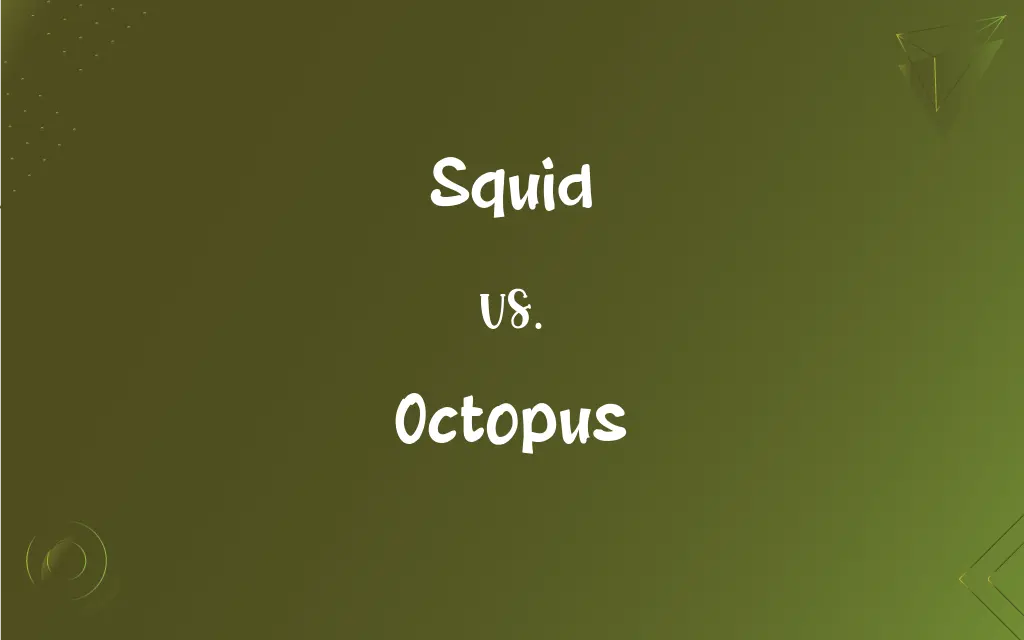Squid vs. Octopus: What's the Difference?
Edited by Aimie Carlson || By Harlon Moss || Updated on June 30, 2024
Squid and octopus are both cephalopods, but squids have a more elongated body, large eyes, and two extra "tentacle" arms, whereas octopuses have a rounder shape, comparatively smaller eyes, and are famous for their intelligence.

Key Differences
Squids and octopuses both reside in the intriguing world of cephalopods, enveloping an array of fascinating aquatic creatures. Squids, notorious for their streamlined bodies and remarkable speed, traverse the ocean with a unique propulsion system, ejecting water through a siphon. Octopuses, on the contrary, are more benthic creatures, occupying the ocean floor with a decidedly more deliberate movement.
Interestingly, the primary anatomy of squids and octopuses showcases noticeable differences despite their close relationship. Squids are notably equipped with a rigid structure called a pen, providing support to their elongated body. Conversely, octopuses boast a completely soft body, which enables them to contort and squeeze through narrow spaces, demonstrating their astonishing flexibility.
The feeding mechanics of squids and octopuses further reveal their varied physiological strategies. Squids utilize their two longer tentacles, adorned with suckers or hooks, to seize prey, pulling it towards their beak-like mouth. Octopuses employ a different approach, using their eight arms, all similar in length, to crawl, explore, and capture prey, often enveloping it entirely with their flexible bodies.
A dive into their behavioral aspects uncovers more contrasts between squids and octopuses. Squids, whether solitary or in groups, are generally considered less curious and interactive with divers or unfamiliar objects. Octopuses, however, display a notable curiosity, frequently engaging with divers, cameras, or novel objects introduced into their environment, showcasing a level of intelligence and problem-solving ability.
When addressing their reproductive habits, squids and octopuses again display disparate methods and lifecycles. Squids often spawn in groups, releasing eggs into open water, which then drift with ocean currents. Octopuses exhibit a more solitary reproductive behavior, with females often guarding their eggs diligently in secluded dens until they hatch, after which the mother typically dies, underscoring the vast variety of life strategies even within closely related species.
ADVERTISEMENT
Comparison Chart
Physical Traits
Squids have a more streamlined body and two long tentacles
Octopuses have a sack-like body and no long tentacles
Size
Generally, squids are larger and can be much longer
Octopuses tend to be smaller in comparison to squids
Habitat
Squids often dwell in the open ocean
Octopuses are more commonly found in dens on the ocean floor
Defense Mechanism
Squids use speed and sometimes ink to escape predators
Octopuses utilize incredible camouflage and also eject ink
Lifespan
Squids generally have a shorter lifespan
Some octopuses can live longer than squids
ADVERTISEMENT
Squid and Octopus Definitions
Squid
Squids possess two longer tentacles, used primarily for catching prey.
The squid snagged the fish swiftly using its longer tentacles.
Octopus
Octopuses utilize a siphon for locomotion and expelling ink.
The octopus rapidly jetted away using its siphon when it sensed danger.
Squid
Squids feature a distinctive internal shell called a pen.
Scientists can learn about a squid's life by studying its pen.
Octopus
Octopuses possess a beak, the only hard part of their body, used to consume prey.
The octopus used its sharp beak to crack open the shell of the crab.
Squid
Squids can eject a cloud of ink to distract predators and make an escape.
The squid escaped the predator by releasing a dark cloud of ink into the surrounding water.
Octopus
Octopuses are known for their ability to change color and texture for camouflage.
The octopus seamlessly blended with the coral by altering its color and skin texture.
Squid
Squids are marine cephalopods with an elongated body and large eyes.
The squid darted away quickly when the diver approached.
Octopus
Octopuses exhibit remarkable problem-solving abilities and curiosity.
The octopus figured out how to escape its enclosure by removing the lid.
Squid
Squids communicate through complex color changes, utilizing chromatophores.
The diver was fascinated by the squid’s rapid color changes, signaling communication or camouflage.
Octopus
Octopuses are cephalopods known for their intelligence and eight arms.
The octopus skillfully manipulated the jar to access the food inside.
Squid
A device that measures minute changes in magnetic flux by means of one or more Josephson junctions, often used to detect extremely small changes in magnetic fields, electric currents, and voltages.
Octopus
Any of various carnivorous marine cephalopod mollusks chiefly of the family Octopodidae, having a soft body, eight arms with suckers, a large distinct head, and a mouth with a strong beak.
Squid
Any of various marine cephalopod mollusks of several families of the superorder Decapodiformes (or Decabrachia), having a usually elongated body, eight arms and two tentacles, a reduced or absent internal shell, and a pair of fins.
Octopus
Something, such as a multinational corporation, that has many powerful, centrally controlled branches.
Squid
Any of several carnivorous marine cephalopod mollusks, of the order Teuthida, having a mantle, eight arms, and a pair of tentacles
Octopus
Any of several marine molluscs of the family Octopodidae, having no internal or external protective shell or bone (unlike the nautilus, squid and cuttlefish) and eight arms each covered with suckers.
FAQs
Do both squid and octopus have ink sacs?
Yes, both squid and octopus can eject ink to distract predators and escape.
Can squids and octopuses change color?
Yes, they can change color and even texture for communication and camouflage.
What is the main physical difference between a squid and an octopus?
Squids have a more elongated body and two extra-long tentacles, while octopuses have a rounded body and all arms of equal length.
Do squids and octopuses have blood?
Yes, and interestingly, their blood is blue due to the copper-based molecule hemocyanin.
How do squids and octopuses reproduce?
Squids release eggs into the water, while octopuses lay and guard their eggs.
How do squids and octopuses breathe?
They both use gills to breathe underwater.
How large can squids and octopuses get?
Sizes vary significantly among species, with the giant squid and giant Pacific octopus being notably large.
How many arms does an octopus have?
An octopus has eight arms.
How many arms and tentacles does a squid have?
Squids have eight arms and two longer tentacles.
Are squids and octopuses edible?
Yes, both are consumed in various cuisines around the world.
What is the largest species of squid?
The colossal squid is the largest known species.
Can octopuses regenerate their arms?
Yes, octopuses can regenerate lost arms.
Are squids and octopuses social animals?
Generally, squids and octopuses are solitary, although some squid species exhibit shoaling behavior.
Do squids and octopuses have a beak?
Yes, both possess a hard, beak-like structure used to feed.
What is the lifespan of an octopus?
Depending on the species, octopuses can live from 1 to 15 years.
Are there freshwater squids and octopuses?
No, all known species of squids and octopuses are saltwater creatures.
Are squids and octopuses intelligent?
Yes, especially octopuses are renowned for their intelligence and problem-solving skills.
Can squids light up?
Yes, some squid species can bioluminesce.
Can squids and octopuses see color?
It's debated, but generally believed squids and octopuses perceive color differently than humans.
How do squids and octopuses move?
They use jet propulsion by forcefully expelling water through their siphons.
About Author
Written by
Harlon MossHarlon is a seasoned quality moderator and accomplished content writer for Difference Wiki. An alumnus of the prestigious University of California, he earned his degree in Computer Science. Leveraging his academic background, Harlon brings a meticulous and informed perspective to his work, ensuring content accuracy and excellence.
Edited by
Aimie CarlsonAimie Carlson, holding a master's degree in English literature, is a fervent English language enthusiast. She lends her writing talents to Difference Wiki, a prominent website that specializes in comparisons, offering readers insightful analyses that both captivate and inform.































































